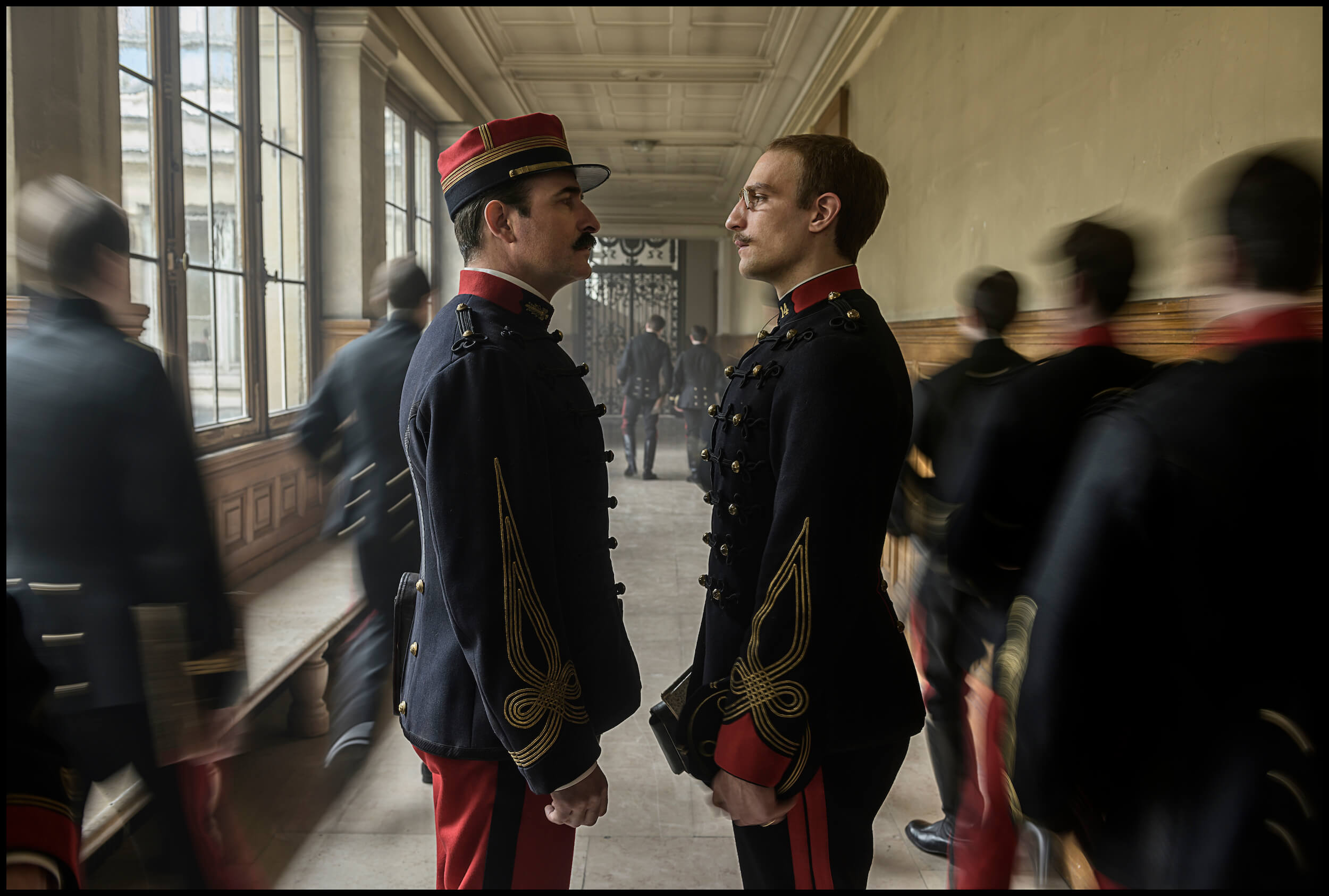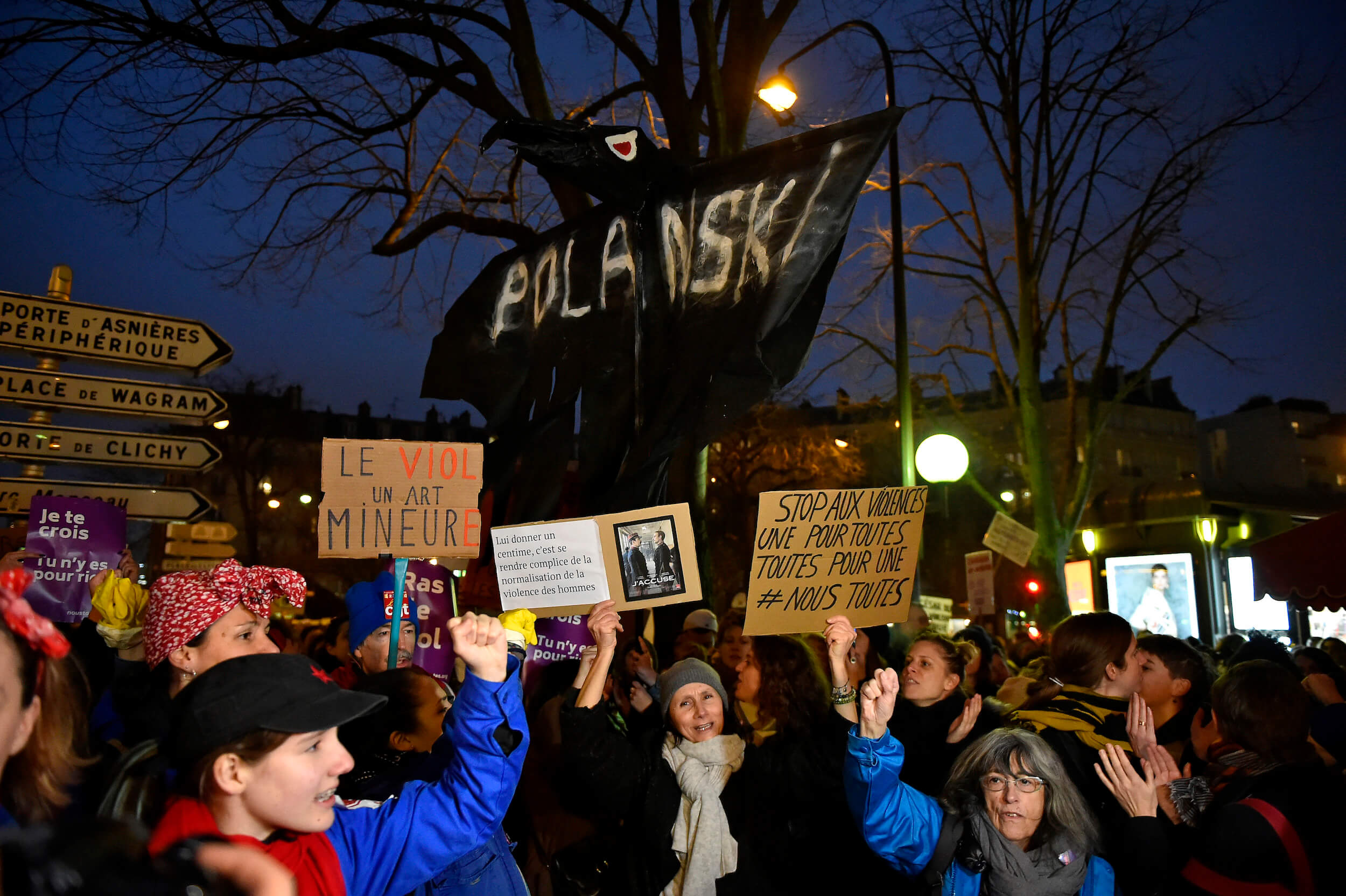Roman Polanski’s take on the Dreyfus Affair is perfect for 2025. That’s the problem
The movie wants to investigate conspiratorial mindsets. What it actually does is darker, and more frightening

Alfred Dreyfus (Louis Garrel, second from left) undergoes the punishment of being degraded in Roman Polanski’s “An Officer and a Spy.” Courtesy of Film Forum
In the opening scene of Roman Polanski’s An Officer and a Spy, a retelling of the infamous Dreyfus Affair — in which Alfred Dreyfus, a French Jewish officer, was falsely accused of treason at the turn of the 20th century — Dreyfus, played by Louis Garrel, is paraded past a silent crowd of his peers to suffer a punishment known as degradation.
That is historically accurate. In 1895, after his conviction, Dreyfus underwent the public humiliation of having the adornments of his rank ripped off his person, and his sword broken, all while he vainly protested his innocence.
But for anyone familiar with Polanski’s own history — or the history of this film, which was released in Europe in 2019, but is only now getting its U.S. theatrical premiere — the double meaning is clear.
Because Polanski, who in 1977 pleaded guilty to “unlawful sexual intercourse with a minor,” is one of the legions of Hollywood men to face public disgrace over sexual misbehavior. (He fled to Europe after learning that a judge planned to issue him a harsher sentence than was agreed in his plea deal.) When An Officer and a Spy first came out, Polanski said that his attraction to the Dreyfus story was in part attached to his own case: “I can see the same determination to deny the facts and condemn me for things I have not done,” he said.
What a difference six years makes. In 2019, only two years after the #MeToo movement rocketed to public prominence, Polanski’s film couldn’t secure distribution in the United States. In 2023, the next movie he made, a poorly reviewed comedy called The Palace, suffered the same fate.
But in 2025, the backlash against #MeToo has reached an apogee, and allegations of rampant antisemitism have come to define much of American political life. Now, An Officer and a Spy‘s long-delayed American premiere — a two-week run at Manhattan’s Film Forum, beginning on Friday — suggests that Polanski’s barely-veiled “J’accuse” against his detractors may be newly relevant.
A scapegoat in search of a savior
Dreyfus is not the hero of An Officer and a Spy. Instead, he’s a foil for the rest of the action: a convenient martyr, whom Garrel bestows with a kind of drippy intensity. No one, including the film’s real subject — Georges Picquart, the antisemitic army official who trained Dreyfus and reluctantly comes to campaign against his conviction — has much attention to spare for him.
Even Polanski seems bored by Dreyfus’ suffering; when his camera visits the desert island to which Dreyfus is banished, it’s more fascinated by the desolate landscape than the lonely Jew wasting away within it. And as Picquart, played by Jean Dujardin, pieces together the conspiracy that framed his formal pupil, he doesn’t appear to feel any real compulsion to reconsider his general distaste for the man himself.

Instead, he’s driven by his commitment to the ideals that have informed his career in the French army, chief among them orderliness and an adherence to proper procedure. To the extent that Picquart is radicalized by his adventures as a political outcast — a natural consequence of his insistence on airing the truth — it’s by becoming skeptical of the official structures in which he once put faith, not skeptical of his own inclination toward bigotry.
In other words, this is the story of a crusader so committed to justice that he sees his personal feelings as unimportant. If Polanski thinks of himself as Dreyfus — polarizing and perhaps unlikable, but the victim of a moral panic nonetheless — he is, in an Officer and a Spy, putting out a call for some powerful party to serve as his Picquart. Which brave soul, the film wonders, will take a similar stand against the social furor that made Polanski a cultural outcast — albeit one who won multiple César Awards, the French equivalent to the Oscars, for this film — not because they like him, but because they can see that what he’s suffered is wrong?
That framing is a bold choice. The men who have attempted post-#MeToo comebacks have generally done so from a stance of bashful victimhood. When Kevin Spacey, whom more than 30 men have accused of sexual assault or inappropriate behavior, received an award at a gala hosted during this year’s Cannes Film Festival, he portrayed himself as a wrongly outcast golden boy now receiving his just rewards. “I feel surrounded by so much affection and love,” he said.
Polanski is doing something different. He’s not suggesting that he’s too nice and gentle to be responsible for all the things of which he’s been accused. Instead, he’s arguing that no matter how much his viewers might hate his guts, they should turn a gimlet eye upon the processes that led to his banishment from Hollywood, the U.S., and even many institutions of European cinema. (A French woman accused Polanski of rape shortly before An Officer and a Spy‘s French release; amid an outcry over French accolades for the film, Polanski didn’t attend that year’s César Awards, and when he was announced as Best Director, several attendees walked out in protest.)
The allegory of antisemitism
After Dreyfus is carted away to exile, in An Officer and a Spy, Picquart, who watched his degradation, is summoned by a superior who asks how the crowd reacted. The feeling, Picquart says, was that of a body that had rid itself of a pestilence.
Polanski is examining how the establishment reacts to what it perceives as the will of the public — how its self-protective mechanisms lead it to be in a constant race to anticipate the people’s prejudices, and fulfill them.
In his vision, the parties complicit in framing Dreyfus appear to be driven not by personal antisemitism so much as the sense that, because Jews have come to be widely held in suspicion by France’s citizenry, acting against Jews is a sure way to maintain their own hold on power. The generals who eventually perjure themselves in an attempt to prevent Picquart’s success know that if they admit that Dreyfus was innocent, the public won’t see them as noble and brave. They’ll see them, instead, as having joined with nefarious forces for personal gain.
Polanski, in making An Officer and a Spy, accurately anticipated a cultural turn that would see all kinds of people beginning to perceive themselves as “the Jews” in situations of societal discord: victims of a witch hunt, based on an ambient cultural sense that someone should be held accountable for all the things that are wrong in all our lives, while authorities tacitly encourage the scapegoating.

It happened during the COVID-19 pandemic, as some who were resistant to public health measures began comparing themselves to Jews in Nazi Germany. It’s happening now, as some Republicans have tried to turn Jews into avatars for conservatives, with the argument being that both groups have been persecuted by promoters of “wokeness.”
There is a natural parallel, as well, in the story of #MeToo. In the movement’s heyday, the locus of power in the sexual realm seemed to have shifted. The time in which successful men could basically do as they pleased was over. A new power structure had been adopted; adherents of the old one began to see themselves as victims of a shadowy new elite.
What happens when people begin to see a real historical conspiracy as an analogy for every development they dislike? Do they find a harmless outlet for their grievances, or do they simply risk becoming more suspicious, and more conspiratorial? In a U.S. where the president owns a social media outlet called Truth, any number of people going to see An Officer and a Spy might see something of their own plight in that of Dreyfus. And any number of them might idolize Picquart as a vigilante uncovering deep governmental rot.
They may or may not be right. After all, there’s much injustice in the world, today as at the turn of the century. But I fear that while An Officer and a Spy might be trying to investigate the kind of conspiratorial mindset that gave rise to the Dreyfus Affair, what it’s really doing is reinforcing it.

















